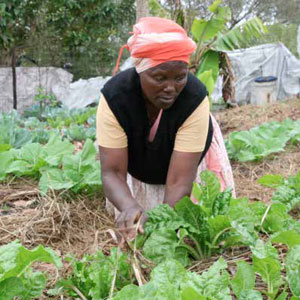Permaculture project feeds the hungry
Permaculture project feeds the hungry Estelle GreeffFor many years, 56-year-old Cabangile Mdletshe worked on other people’s fields as a weeder. Mdletshe says life was difficult and she had to find ways to support her eight dependants.
 Life was tough for the resident of Khula village in Mtuba, northern KwaZulu-Natal, and she often had to travel long distances to harvest iKhwani (water straw grass), knit it to make grass mats, which she sold.
Life was tough for the resident of Khula village in Mtuba, northern KwaZulu-Natal, and she often had to travel long distances to harvest iKhwani (water straw grass), knit it to make grass mats, which she sold.
Things have improved for Mdletshe, her family and village as a result of Department of Agriculture and Rural Development’s training programme on the use of permaculture system.
Permaculture is a system of agriculture that is developed to be sustainable, ecologically sound and self-sufficient.
After receiving the training, Mdletshe and 179 families were given a plot, which they used to start a garden using a permaculture system.
The department’s Agricultural Technician, Samke Khanyile, says the project to establish the gardens in impoverished homesteads began in 2011 through a joint effort between the Departments of Agriculture and Rural Development and Cooperative Governance and Traditional Affairs (Cogta).
“Cogta provided the funds to hire the Nkanyamba Development Trust as trainers to train residents. The department provided seeds and agricultural technicians as local agents for food security.”
Mdletshe says this method of planting does not demand a lot of strength.
“It is easy planting using this system because all you do is neatly place cardboard paper on top of grass all over the area that you want to turn into a garden. Next step is to heap up layer of cow manure, leaves and grass over it.
“After that I begin watering the layer with either bath, washing or cooking water for a few days so that the layer becomes compost. When that has happened I start planting seeds. The grass that I put on top ensures that moisture remains in the soil and that encourages the earthworms to work the soil.”
She added that the programme has helped her and her family.
“Sometimes neighbours buy from me and that gives me a little extra money to buy what I need,” she adds with a smile.
*Buyanima-Afrika Mkhulise works for the KwaZulu-Natal Department of Agriculture and Rural Development.
For more information, contact the department of Agriculture and Rural Development: 0800 007 095